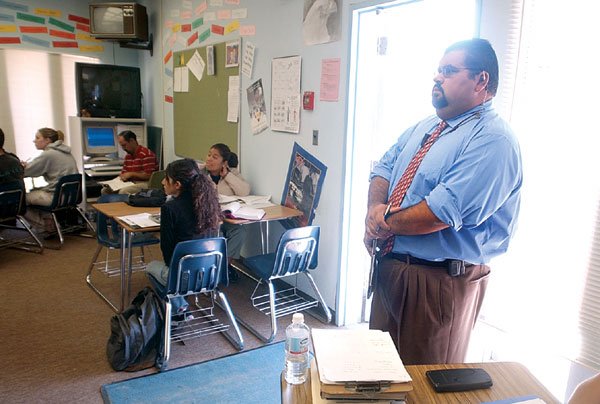Gilroy
– Principal Bob Bravo is starting his third year as Gilroy High
School’s leader feeling enthusiastic about the student body and new
staff members, despite spending time in the center of academic and
communication controversy.
By Lori Stuenkel
Gilroy – Principal Bob Bravo is starting his third year as Gilroy High School’s leader feeling enthusiastic about the student body and new staff members, despite spending time in the center of academic and communication controversy.
“I think we have a lot of potential to go forward,” he said, in between picking up bits of litter and observing teachers in the classroom this week.
He sees the school’s three main elements – students, teachers and parents – coming together this fall in a way that will bolster both academics and morale.
“Watching the kids in the first couple of days, … I’m just really, really proud of this group of students right now. They want to learn,” Bravo said. “I’m very enthusiastic about them; they just seem to have a good attitude.”
On the third day of this new school year, Bravo loomed large in the doorway of a math teacher’s classroom, mentally noting that she asked students to recount exactly how they solved a problem – a self-awareness about learning that’s important for students to achieve, he says. He stayed only for a few minutes, then quickly walked away, clipboard under his arm and pen in his pocket.
Even with thousands of students cramming into campus during breaks, the crowd parts as Bravo makes his way from his office – where his prized Captain America figurines and collectibles hold vigil – to the quad, where he stands on a low bench, so he can be seen above the mass by all students and supervisors.
The 36-year-old San Jose native’s enthusiasm comes after two years of intense scrutiny from a myriad of sources – parents, teachers, students, and local media. Some explosive situations he inherited, including honors courses – the reason for his predecessor’s resignation – and some blew up on his watch. The book list, a perennial flashpoint, spurred a review of the entire English curriculum and the adoption of a new textbook. Teacher evaluations are being re-worked after a teacher was dismissed last year, for reasons that remain largely unexplained.
At least on the third day of school, the students’ attitude that so impressed him was apparent in the classroom. As Bravo made his regular round of classroom visits, no student was without a textbook, notebook or pen. When teachers asked questions, they readily responded out loud.
The teachers, veterans and rookies, also are a source of pride for Bravo – particularly those 17 who are just joining the Gilroy High staff.
“I am enthusiastic about our group of new hires that we have this year,” he said, while sitting for a few minutes at his pristine desk. “It’s early in the game so, of course, someone could change my mind, but based just on going through hiring and watching people work, based on the observations of mentor teachers in the summer … I feel we may have the strongest group of new hires that we’ve had in the time I’ve been here.”
Bravo’s enthusiasm is matched by the challenges he faces this year, particularly GHS students’ dismal math scores: 97 percent of Algebra students are considered below grade level. Assistant Principal Kat Hannah, new to the school this year, will make improving math test scores this year her top priority.
As for parental support, Bravo says it’s never been better, noting that on the first day of school, parents called him and volunteered to help out directing freshmen to their new classes, while the Parent Club gave all GHS teachers a first day survival kit with items like pens, pencils and tissues.
After two years, Bravo is credited by many with resolving two major issues facing the high school at his entrance: student discipline and staff unity.
“It’s really hard because a few years ago, it was really different,” said Margarita Nunez, mother to a GHS sophomore and a GHS graduate. “They are doing a really good job here, the kids are really well behaved now.”
The atmosphere is not only improved for students, but for staff, who are now moving in the same direction toward student improvement, Superintendent Edwin Diaz said.
“He’s been able to establish credibility with staff and establish himself as the instructional leader,” Diaz said.
Bravo will combine his enthusiasm with lessons he’s gleaned from the historical figures – like John F. Kennedy and Civil War Generals – he reads about in his free time, in order to further motivate GHS staff. His roots as an educator are as a history teacher, having taught the gamut of history classes at GHS for five years, starting in 1991.
“I think I especially like to read about history because a lot of times, what you’re reading about is decision making,” Bravo said. “Heaven knows I’ve made mistakes, and, sadly enough, I’ll probably make more, but the fact that you’ve made mistakes doesn’t mean you like to. You want to get better.
“It’s interesting to read about different contexts, like a general or a president. It’s not the same thing, but it’s interesting to see the different leaders, how they motivate people. How do they recover from mistakes? How do they work to change perceptions … that maybe things aren’t as bad as people think they are?”
Managing a campus full of 2,400 teenagers and a hundred staff, Bravo is in constant communication during his daily routine. At brunch and lunch his earpiece and microphone help him coordinate with other supervisors; he checks e-mail several times a day; when walking around campus, he fields comments and questions from students. After viewing each classroom on his beat, or as needed when a thought pops into his brain, Bravo pulls out his three-inch-long “Inspector Gadget notebook” and jots down notes to later write memos or call someone for a follow-up conversation.
Communication – with parents, students, teachers, other administrators and district staff – is one of the most visible parts of Bravo’s job, and also the part that draws the most criticism.
“I thought he handled my particular instance with my daughter not in the very best way,” said Shairon Williams, who has three children at GHS. One of them became embroiled in controversy last year when she said the school administration lied about confiscating vests with messages of protest after a teacher was laid off.
Williams said she wasn’t satisfied that Bravo told her the truth when they met, but that he was respectful. She still maintains that she never got what she was looking for – an apology.
Denise Apuzzo, a Gilroy Dispatch columnist and co-president of the GHS Parent Club, has written that communicating with parents is Bravo’s Achilles heel.
Students say that, to them, Bravo is largely behind the scenes.
“He doesn’t seem to interact with students,” senior Nicole Wheeler said. “He could be the man behind it all, but we just don’t see him.”
“Bob has obviously heard the criticism, and he’s taken that to heart and that’s something that he’s already identified as an area that he wants to work on,” Diaz said. “He interacts with a very diverse group of parents, a diverse group of students and staff … and that’s something that’s a challenge for all of us … to develop those types of positive relationships with any diverse population.”
Bravo acknowledged that communication with parents is a priority, and said that if he and other GHS staff members continue to focus on it, it will be “another piece of the puzzle” that will fall into place.
Communication takes on a different dynamic in Gilroy Unified, with an active and highly vocal cohort of parents and the community newspaper that covers the schools closely, as Diaz noted in his state of the schools speech a couple of weeks ago. Bravo said the attention on the district and its only high school makes his position a “different kind of job,” with pluses and minuses.
On the plus side, academic and athletic accomplishments of GHS students and staff are frequently recognized.
“We can always get better, no doubt about it, but I think also sometimes we lose perspective about it. It’s right to be critical, it’s right to need to get better, but I think we get to the point where – OK, we know what we need to do, let’s do the work and … the scrutiny does get to the point where it can be a de-motivator.”
GHS teacher Jose Hernandez, responding recently to criticisms of Bravo, in a letter to the editor said that people often misunderstand Bravo’s deliberate, analytical style and are too quick to criticize.
“I think he has a very good attitude about it,” Diaz said. “He realizes it comes with the territory, but still, it’s a concern for all of us because we don’t want to burn out people every two or three years.”
While in the spotlight, Bravo tries to instill in his teachers the desire to improve without placing them under too much stress: It’s a balancing act, he said.
“It’s finding that place of: How do I communicate our need to continuously improve and, yes, create some stress for some people because it will help them work, more often,” he said, “but not just to create anxiety where you stop having that motivation, and you have more of a shut-down effect.”















